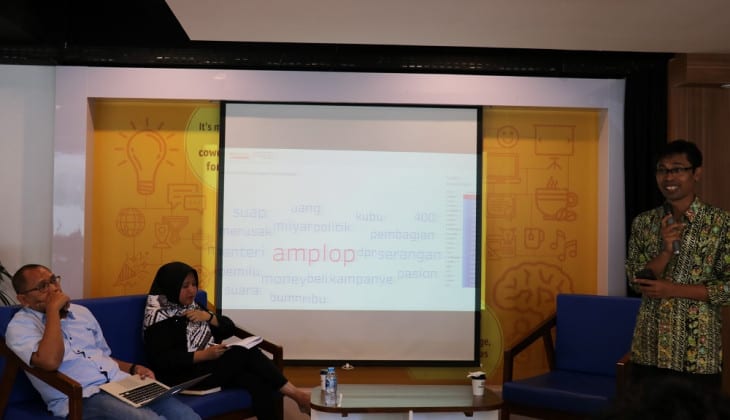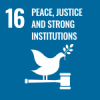
Big Data Analytics Laboratory and PolGov Research Center Department of Politics and Government (DPP), the Faculty of Social and Political Sciences UGM released the results of the mapping of the political potential of the 2019 election money on Monday (15/4).
From the analysis of big data on 7,647 conversations related to money politics variants on social media conducted from 2-12 April 2019, it showed that conversations about money politics occurred a lot in Java.
“Geographically, West Java is the area with the highest level of conversations related to money politics with 433 conversations mostly in Bandung, Bogor and Bekasi, followed by Jakarta with 358 conversations, and East Java with 222 conversations,” said lecturer and researcher at the UGM Faculty of Social and Political Sciences, Dr. Wawan Mas’udi, during the Press Conference on the Release of Big Data Results “Map of the Political Potential of the 2019 Election Money” on Monday (15/4).
The three regions show the highest number of conversations regarding money politics compared to other regions that are under 100 conversations. Even though conversations about money politics have been piling up in the Java region, Wawan said that the conversation is also common in Eastern Indonesia.
“This shows that our society is quite concerned with money politics,” he said.
Meanwhile, from a total of 7,647 talks on social media related to money politics, only 1,817 whose locations were detected by the keyword ‘envelope’ among other indicative words. Conversations about money politics peaked on April 11, 2019 with 2,291 conversations. The conversations were driven by statements that led to the accusation of one of the presidential candidates and sporadic reports that conveyed the practice of buying and selling votes by legislative candidates.
Wawan said the practice of money politics would be more intensively carried out near the Election Day. Therefore, it must be a concern of all elements of the country.
“We must monitor the issue of money politics together,” he said.
Other political observers of the DPP UGM administration, Dr. Mada Sukmadjati, shared the results of a voter survey and qualitative research on the potential of money politics and the financing of regional head candidates in Yogyakarta and Madiun in 2018.
The results of the voter survey in Yogyakarta showed that only 17.38% of the voters thought that giving money or goods in the election was permissible, while 79.38% stated that they should not accept gifts or money, and the remaining 3.25% did not know or did not answer.
“Normatively everyone knows that money politics is haram or not permissible in Islam,” he said.
The survey on whether voters would accept money or gifts was conducted again. As many as 34.5% said yes, 60.12% said no, and 5.38% did not answer. This, said Mada, shows asynchronization or contradiction between cognition and practice by the community.
“Does this show that our voters are bipolar? We also need to discuss the pressure on money politics which might lead people to compromise, “he said.
Other findings show that the practice of buying and selling votes is not influenced by gender and age. However, social class, including education and income of the voters, is a factor. Voters who did not go to school or were graduates of primary and secondary schools were more likely to receive money or goods from candidates. 35.76% of voters who would accept gifts were high school graduates, 46.15% did not complete elementary school, and 20.2% were graduates of higher education. Around 40% of voters with an income below Rp. 2 million reported to be willing to accept gifts compared to those with an income above Rp. 5 million, which was around 20%.
“Money politics through buying and selling votes will be massive in areas with low income and education levels and a high population,” he explained.
Mada said that money politics happens due to economic, political, legal and cultural factors. In order to reduce the practice of money politics, he proposed several short-term and long-term solutions. A long-term solution would be to include materials into school education within the topic on anti-corruption. The short term solution would be to conduct election control patrols by the Election Supervisory Body and voters so that participatory supervision can be done at the same time.
“Solutions and initiatives from civil society are also needed to minimize money politics,” he concluded.
Source: https://www.ugm.ac.id/id/berita/17831-pemetaan-potensi-politik-uang-pemilu-2019



